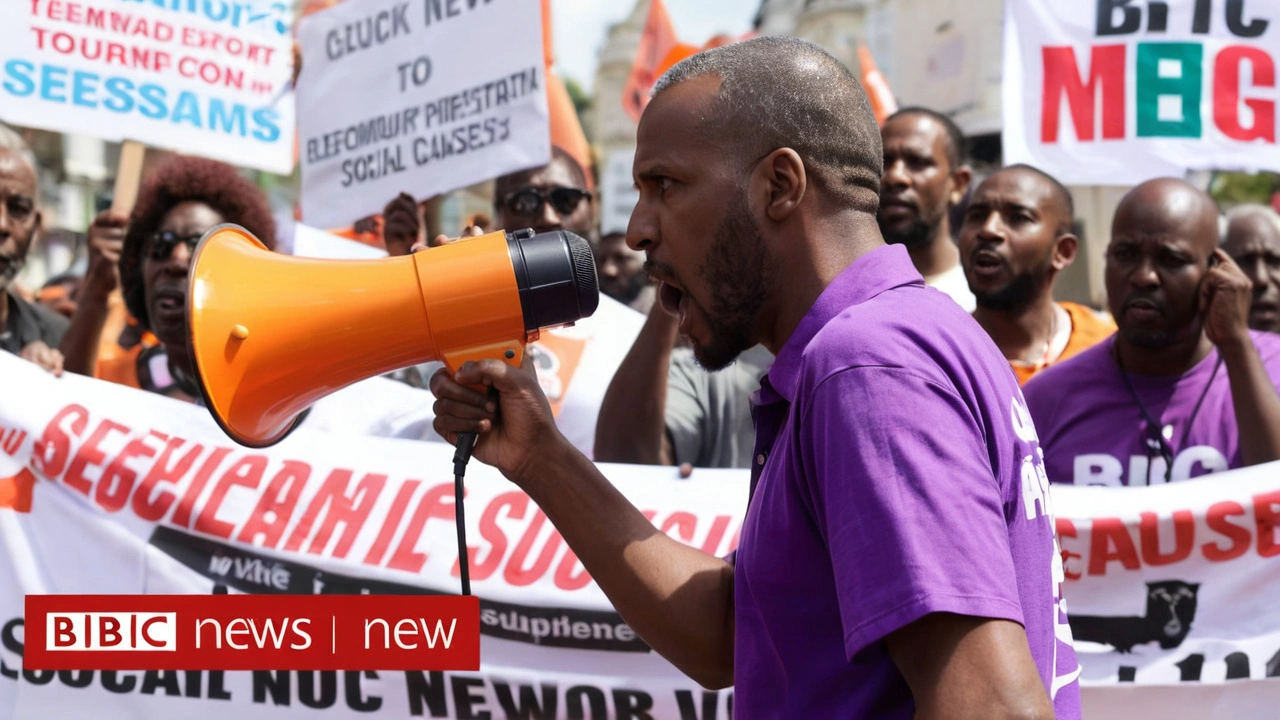BBC Introduces Pidgin Digital Service to Engage West African Audiences
The BBC World Service has made a striking move by launching a new language service in English-based Pidgin, specifically tailored for digital platforms targeting West and Central Africa. Pidgin isn’t officially recognized but is an essential part of daily communication for millions, especially among the youth. The service is set to provide a broad array of content ranging from local and regional news to international affairs, cultural stories, and beyond.
The Importance of Pidgin
Pidgin’s unique blend of English with elements of local languages makes it a vibrant and practical mode of communication across West Africa. Despite its lack of formal recognition, estimates suggest that around 3-5 million people in Nigeria use Pidgin as their primary language. In Nigeria alone, up to 75 million individuals employ it as a second language, underscoring its expansive reach and significance. Its use spans informal conversations to music and media, embedding it deep within the social fabric. The BBC's decision to embrace Pidgin aligns with its goal to reach a wider audience and deliver news in a relatable and accessible manner.
A Comprehensive Content Model
The Pidgin service will cover an extensive range of topics. The mix will include local, regional, and international news, current affairs, and insightful analysis. The cultural segment will highlight stories from the heart of West African communities, exploring traditions, entertainment, and lifestyle. Additionally, the service aims to cover entrepreneurship, science, technology, health, and sports, thus providing a holistic view of significant developments. This broad-spectrum approach means that there’s something for everyone, encouraging greater engagement from diverse audience segments.
The Lagos Production Hub
Anchoring this service is a production hub based in Lagos, Nigeria. Lagos, being a bustling metropolis with a rich cultural heritage and dynamic population, serves as an ideal base for the service. The hub is set to foster creativity and innovation, ensuring content is locally relevant while also meeting international standards. Beyond Lagos, reporters in Ghana and Cameroon will contribute, providing a rich tapestry of perspectives across the region. This collaborative model is designed to produce comprehensive and diverse reporting, reflecting the multifaceted nature of West African societies.
A Strategic Expansion
This move by the BBC is part of its most significant expansion since the 1940s, bolstered by a government funding boost in 2016. The funding has enabled the BBC to embark on this ambitious project, reflecting a commitment to enhance its global news offering. By tapping into the untapped potential of Pidgin, the BBC is poised to strengthen its presence in West Africa, drawing on the lingua franca that bridges various ethnic groups and communities. The expansion is not just about geographical reach but also about intensifying engagement by delivering content that resonates deeply with the audience.
Conclusion
The launch of the BBC's Pidgin digital service marks a milestone in news broadcasting for West and Central Africa. By acknowledging and embracing Pidgin, the BBC is not just offering news but is also recognizing and validating an essential part of the region's cultural identity. This initiative promises to create more informed, connected, and engaged communities across the region, leveraging the power of language to bridge gaps and foster understanding.







17 Comments
Wow, seeing the BBC finally recognize Pidgin is a huge step forward for the region; it not only validates a language spoken by millions but also opens doors for more inclusive storytelling. By targeting the digital space, they’re meeting the audience where they already spend most of their time, and that’s a smart move. I hope the content will stay true to local perspectives rather than just echoing Western narratives. Let’s keep the momentum going and push for even more regional languages in the future.
It is commendable that the BBC has allocated resources toward a Pidgin service, especially given the linguistic diversity of West Africa. The establishment of a Lagos production hub demonstrates a commitment to local relevance and journalistic standards. I anticipate that this initiative will foster greater engagement among younger audiences who primarily consume content online. This strategic expansion aligns well with the broader objectives of global media outreach.
Honestly, the BBC’s decision feels overdue; Pidgin isn’t just a slang, it’s a cultural bridge that cuts across ethnic lines. With reporters stationed in Ghana and Cameroon, the service can offer a mosaic of narratives that challenge monolithic portrayals of the region. I’m excited to see how the blend of news, culture, and tech will resonate on platforms like TikTok and Instagram. This could set a precedent for other broadcasters to take grassroots languages seriously.
Finally some real talk in Pidgin! 😊
The launch of the BBC’s Pidgin digital service represents a quintessential example of media convergence, wherein traditional broadcasting paradigms intersect with emergent digital ecosystems to catalyze audience segmentation strategies. By leveraging a lingua franca that permeates informal discourse across West Africa, the organization can operationalize hyperlocal content pipelines while maintaining macro-level editorial oversight. This duality enables the ingestion of user-generated data streams, fostering iterative feedback loops that refine content relevance in real time. Moreover, the Lagos production hub serves as a nodal point for interdisciplinary collaboration, integrating journalistic rigor with creative storytelling modalities. In practice, such a hub can synthesize investigative reporting with multimedia assets, ranging from short-form video to interactive infographics, thereby enhancing the cognitive bandwidth of end-users. The inclusion of correspondents in Ghana and Cameroon further expands the geographical data mesh, ensuring that the resultant news tapestry is not Nairobi‑centric but genuinely pan‑regional. From a strategic communications perspective, the initiative aligns with the BBC’s mandate to champion diversity, equity, and inclusion across its global footprint. The operationalization of Pidgin also mitigates linguistic bottlenecks that traditionally impede information diffusion in low‑resource language settings. Consequently, this reduces the latency between event occurrence and audience awareness, a critical metric in crisis reporting scenarios. In terms of monetization, the digital platform paves the way for programmatic advertising models that are tailored to culturally resonant narratives, optimizing CPM yields. Simultaneously, the service can function as an incubator for talent development, nurturing a pipeline of local journalists adept at navigating both editorial ethics and digital production tools. By embedding analytics dashboards, the BBC can monitor engagement KPIs such as dwell time, shareability, and sentiment polarity, thereby informing iterative content strategy. This data‑driven approach is essential for maintaining competitive parity in a fragmented media landscape. Ultimately, the Pidgin service is not merely an expansion of language offerings; it is an embodiment of adaptive resilience in the face of evolving consumption patterns. As the digital horizon continues to expand, such forward‑looking initiatives will likely become the normative benchmark for international broadcasters.
While the intention behind the service is laudable, one must question whether the BBC truly understands the nuances of Pidgin or is merely capitalizing on a marketing opportunity.
I hear your concerns, but there’s also a genuine chance here for community empowerment; when people see their everyday language reflected in reputable news, it can boost both trust and participation.
yeah this could be a game changer for youth who are always on their phones the content will be more relatable and the vibe feels fresher
Indeed-such an initiative begs the question: how will the BBC ensure that the authenticity of Pidgin is preserved without succumbing to oversimplification???
Balance is key; keep it real, keep it useful.
Finally, a media giant gets it right-leveraging native linguistic capital is essential for market penetration and cultural legitimacy.
Honestly, this feels like a token gesture, a PR stunt to appear inclusive while the real power structures remain untouched.
The Lagos hub could become a vibrant tapestry of stories weaving together the old and the new, a real mosaic of voices that reflect the continent's pulse
Im excited to see how they bring local flavors into the mix, hope they keep the vibe authentik
Can't wait to binge on the Pidgin clips 😂 it's gonna be lit!
It will be important to monitor editorial standards and ensure factual accuracy across all segments
For anyone curious about where to tune in, the BBC Pidgin service will be available on their website and major social platforms-feel free to share your favorite links! 😊